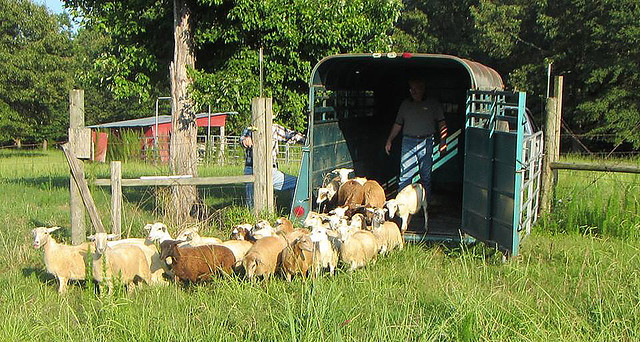Biosecurity should be at top of summer ‘to do’ list
By Carol Sanders
writer/editor
UAPB School of Agriculture, Fisheries and Human Sciences
(668 words)
PINE BLUFF, Ark. – Biosecurity should be at the top of livestock producers summer “to do” list, said David Fernandez, Cooperative Extension Program livestock specialist at the University of Arkansas at Pine Bluff.
Summer is a time when producers are selling young animals to 4-H and FFA students; offering lambs, kids or calves for butchering direct to the public or traveling to shows and fairs to exhibit animals.
Often, producers do not take precautions against new diseases or parasites being introduced to their farms or ranches. Biosecurity is a common-sense approach to preventing disease transmission.
The steps of a good biosecurity program are not usually expensive, but they require planning ahead, he said. If you have visitors such as 4-H or FFA students or members of the public purchasing animals, have a separate location to bring the animals to be viewed, away from areas where your animals frequent.
Do not allow visitors free access to your farm, he said, as you do not know how many other farms they have visited nor what is on their shoes. Fernandez said that he has known several producers who did not have hoof rot on their ranches but had sudden outbreaks after visitors left. Ranchers discovered that visitors had been to farms known to have hoof rot. If visitors must move cross areas frequented by livestock, provide visitors with disposable shoe covers to reduce the transmission of disease, he said.
The same precautions apply to trucks and trailers. Delivery trucks bringing feed and supplies or trucks picking up livestock or livestock products can carry diseases from one farm to another. Have a loading area on the edge of your farm where vehicles will not come into contact with pastures and dry lots. If this is not possible, have a tire bath with a disinfectant for vehicles to drive through.
When returning from a fair, avoid driving your truck and trailer on the farm before thoroughly cleaning the tires and under the wheel wells. Wash out the trailer interior so that water drains away from your livestock at home, he said. Manure and contaminated soil from the fair can contaminate your farm.
One of the simplest ways to reduce introduction of a new disease to your ranch is to be sure your animals are up to date on their vaccinations. A good vaccination program can reduce the spread of diseases, Fernandez said. Be sure the feeding program is meeting all the nutritional needs of the animals. A well-nourished animal is more resistant to disease that one lacking a critical nutrient.
If you are going to a fair, reduce your animals’ stress. After transporting, be sure they have access to clean water and a comfortable place to rest. Interrupted feeding regimens during their fair stay can be stressful. Always have someone near your animals to keep fairgoers from disturbing them excessively, he advises.
Try to minimize animals’ exposure to other animals. If you can, place a solid barrier between your animals and those in the neighboring pen. Avoid sharing grooming equipment with other exhibitors. Remove show stock from the fairgrounds as soon as permitted, preferably within 72 hours, he said.
Have separate clothing to wear on the show circuit and at home. Boots and hems of jeans can easily pick up fecal contaminants and transport them to your farm. Clean and disinfect tools thoroughly before using them again at home.
Watch for hazards that can injure animals. Some of the smaller and older fairgrounds may not have been fully maintained. Broken wires and pipes on corrals and pens can cause puncture wounds and serious lacerations, he points out. Animals can be injured during loading and unloading or while standing at grooming tables.
Prepare a secure location to quarantine animals when you return home. Do not mix them with the rest of the herd or flock for at least 30 days. This allows for treatment of any diseases that they may have brought home without infecting the rest of the herd, Fernandez said.
For more information about this topic or other livestock questions, contact Dr. Fernandez at (870) 575-7237214 or fernandez@uapb.edu.
The University of Arkansas at Pine Bluff School of Agriculture, Fisheries and Human Sciences offers all its programs and services (including employment) without regard to race, color, sex, national origin, religion, age, disability, marital or veteran status, genetic information, sexual preference, pregnancy or any other legally protected status, and is an equal opportunity institution.
# # #
Media Contact: Carol Sandes
UAPB School of Agriculture, Fisheries and Human Sciences
(870) 575-7238
sandersc@uapb.edu
Related Links
